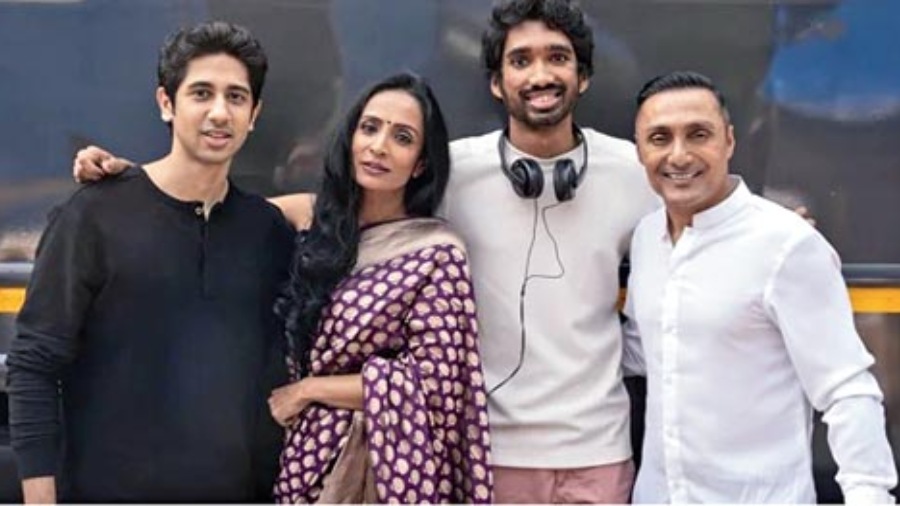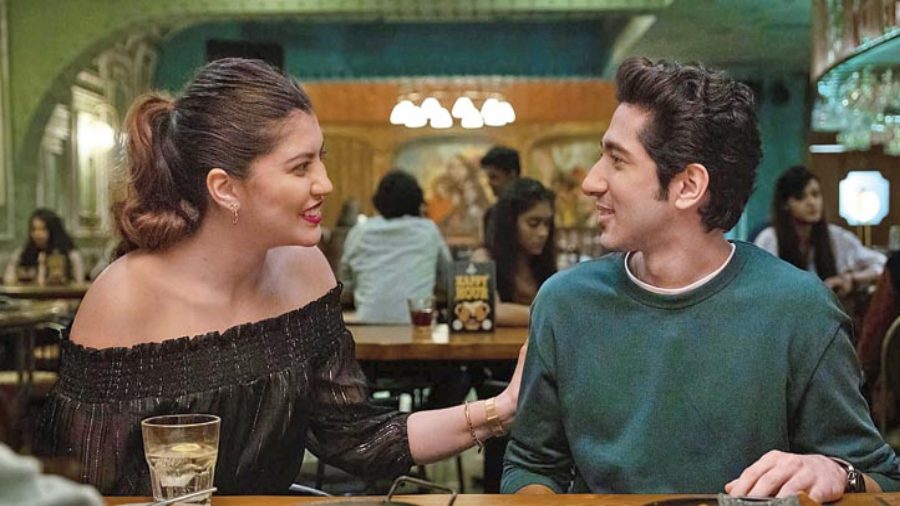Eternally Confused and Eager for Love, an eight-episode series on Netflix that premiered last weekend, tells the story of Ray (played by Vihaan Samat), an affable but awkward young adult, who follows his inner voice named Wiz (voiced by Jim Sarbh) to figure whether he wants sex, love or a relationship. Created and directed by Rahul Nair, Eternally Confused and Eager for Love — which has met with positive reviews and encouraging word-of-mouth — also stars Rahul Bose, Suchitra Pillai and Ankur Rathee, and is produced by Farhan Akhtar, Ritesh Sidhwani, Zoya Akhtar and Reema Kagti under the banner of Excel Entertainment and Tiger Baby Films. The Telegraph chatted with director Rahul Nair and actor Vihaan Samat on their show.
Rahul, what was the genesis of this intriguingly named show?
Rahul Nair: I returned from college in 2015, and when I came back, I realised that Bombay is very much similar to New York where I had studied. And I realised all cities are pretty much the same, but with their own quirks and elements. At that age, everyone is looking for love... or at least looking for some version of things. That’s where it started, and I took it forward and turned it into the show.
Is it autobiographical in some way?
Rahul: There is certainly a part of me in Ray. But beyond that, I used stories from the lives of my friends, and their friends.... I didn’t base all of it on my life, I just based it on the fact that one could be this person and then how would you react, how would you deal with life if romance was a struggle....
Vihaan Samat: It’s the same for me. I relate to a lot of parts of Ray... like overthinking and awkwardness and not knowing what to do, trying to overcompensate by overexplaining things.... Those are things that have happened to me in the past. Thankfully, not so much anymore. But it was fun to revisit those moments and relive the awkwardness and put it into Ray and go, ‘Oh my God! I don’t believe I did it!’ (Laughs) It was just an amazing experience to play a character like this.

I relate to a lot of parts of Ray... like overthinking and awkwardness and not knowing what to do, trying to overcompensate by overexplaining things.... Those are things that have happened to me in the past. Thankfully, not so much anymore. But it was fun to revisit those moments’
VIHAAN SAMAT
Taking a cue from the title, what’s been the most confusing period of your life?
Rahul: For me, it was when I returned from college. When you are in college, you think certain things, you have a certain expectation from life, you think things are going to go a certain way. A part of me thought I would stay on in America, but I returned. So it felt like a clean slate when I came back to Bombay. Here I was hanging out with my school friends who I hadn’t met in five years. So it was an opportunity to shed history and start afresh. It was a confusing time, but looking back now, I feel it was also the time where I was able to achieve the most clarity. All said and done, I guess it worked out....
Vihaan: I was going to say my school days, but that was actually not confusing. We just went through life not knowing anything, but we were happy, we were blissful.... It was like, ‘Now I am going to have this in my tiffin and then I am going to sit in class and then I am going to go home and watch Shinchan’ (smiles). The confusing phase started as I approached graduation and then after that, followed by finding work and just trying to figure how life works in terms of a career, how should I present myself, do I change myself, am I enough... all those questions, you know. I am still quite confused (smiles), but I feel I am a little better equipped for life now.
And what about love?
Vihaan: I am pretty happy where I am in terms of love (smiles).
Rahul: Same! (Laughs)

Director Rahul Nair (second from right) with Vihaan Samat, Suchitra Pillai and Rahul Bose
Do you think the DNA of youth essentially is the same everywhere?
Rahul: They may not be the same everywhere, but there are certain relatable aspects that are universal. The best example is in our show itself where Ray’s parents (played by Rahul Bose and Suchitra Pillai) don’t force him to do things, but they do provide him an alternative solution because they can see that he is struggling. That is not something that we see happening much in Western cultures.
But fundamentally, everyone reaches a point where they are looking for something... whether it’s just a one-night stand, whether it’s romance, whether it’s a girlfriend or a wife.... But there are unique elements to each culture that make it interesting and different.
Vihaan: Everyone wants to find a connection. And everyone has messed up something in some way and everyone is hoping for the best. Those three things are the core of our show.
Rahul, would it be fair to call Eternally Confused and Eager for Love a coming-of-age tale?
Rahul: Coming of age is certainly one aspect. It’s more of a dramedy. There is a comedic aspect but because Ray has an inner voice and we get to see how his mind works, there are dramatic elements as well. We get to see a person coming to terms with himself. In many ways, I feel it’s less coming of age and more of coming to terms with yourself and realising that you are a certain type of person. I think everyone goes through that.
What’s your favourite coming-of-age story?
Rahul: Some of the ones I like may not necessarily be coming of age, but they appeal to me because I see an arc in the storyline. A lot of Seth Rogen films, like Superbad, have a character start at a particular place and then learn something and make a journey at the end of the story. That, for me, is coming of age. I am drawn to comedies where there is always a life lesson hiding behind the fun and the chaos and the stupid nonsense. Another one I can think of is The Squid and the Whale....
Vihaan: Boyhood is one, and so is The Pursuit of Happyness. Also, What’s Eating Gilbert Grape? in terms of how the characters are finding their footing.

Coming of age is certainly one aspect. It’s more of a dramedy. There is a comedic aspect but because Ray has an inner voice and we get to see how his mind works, there are dramatic elements as well. In many ways, I feel it’s less coming of age and more of coming to terms with yourself
RAHUL NAIR
Rahul, the imaginary voice trope in your show must have been a challenge. What were the difficulties of writing something like that?
Rahul: It ended up being easy to write when I decided very early on that I wanted the audience to know what the character is thinking. That sort of spring-boarded into, ‘Okay, let him talk to himself’, which, in turn, led to, ‘Okay, let me have him talk to a voice in his head.’ Every time I wrote those scenes, it was pretty much like, ‘What would I think in this moment?’ Which is why sometimes on the show, some of the thoughts that Wiz (the voice in Ray’s head, voiced by Jim Sarbh) has tend to be off track. That’s because when I am in a situation, I often think something that’s completely unrelated, and then I have to get myself back on track. That’s how the human mind works... it’s fun and chaotic, and writing that simply involved just thinking about how people think (smiles).
If you had an imaginary voice in your head five years ago, what advice would you have wanted it to give you?
Rahul: I am pretty happy where I am right now. So I guess the advice would have been, ‘Just keep doing what you are doing. It’s potentially going to work’. But I think the best advice I would have wanted to get earlier in my life is to stay calm because there is always a lot more to life. Not to overthink it basically... which is literally the opposite of what Ray is doing.
Vihaan: It’s the same for me. Don’t stress too much, spend time on things that you can do right now which you may not be able to do in the future, which includes building skills, activities, friends and family.... Don’t worry about peoples’ expectations of you, it’s not worth it.
